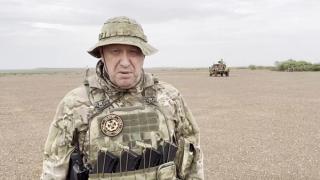There is a brutal joke now doing the rounds in Russia.
It runs along these lines.
Vladimir Putin is unable to sleep and so, in the small hours of the morning, he is wandering the corridors of the Kremlin.
He comes across the ghost of Joseph Stalin and takes the opportunity to beg the spectral Soviet dictator for his advice: “Comrade,” Putin begins.
“Please tell me what to do. Russia is in an appalling mess with the army bogged down in Ukraine; the economy is a disaster under sanctions, and our international standing could not be lower. People have lost faith in my government.”
Stalin smiled grimly and replied: “Your answer is in two parts.
“First, take your government out and shoot the lot of them.
“Second, paint the Kremlin blue.”
Putin is puzzled. “Why blue?”
Stalin laughed. "I knew you would not object to the first one."
The death of Yevgeny Prigozhin and the other passengers in the private jet a few days ago, bound for St Petersburg from Moscow, underlines that the joke has more than a passing resonance in today’s politics in Russia.
The simple fact of the matter is: ‘Murder Incorporated’ has a comfortable home in the Kremlin in Moscow.
Prigozhin’s death was spectacularly executed and stands in marked contrast to the deaths of others who have angered Putin.
Generally, both at home and abroad, Putin's enemies die from poisoning or unfortunate falls from a high window.
Otherwise, as at least two of his failed generals in Ukraine have experienced, people simply die in unexplained circumstances.
These scenarios are all taken from the Stalinist playbook, which had as its core objective the determination to make sure that all of Russia, and now the entire world, understand without any doubt who is responsible for the deaths.
Prigozhin’s death is simply another signal that Putin’s ruthlessness will accept no alternative leadership or challenge.
President Joe Biden’s wry comment to the effect that nothing happens in Russia without Putin being behind it is not only amusing but also accurate.
Soviet dissidents used to always joke that no accident ever occurred without careful planning.
Prigozhin’s disaster in the air almost certainly falls into that envelop.
The death of Prigozhin and his Chief Lieutenant, Dmitry Utkin, leaves the Wagner military arm leaderless.
This suits not only Putin, but also the Chiefs of the Russian defence forces, who were Prigozhin’s principal targets in his brief mutiny.
The fact that Prigozhin was just returning from a visit to Africa, where his mercenaries play key roles in places as diverse as Libya and Mali, demonstrates the significance of Prigozhin’s legacy.
Putin now needs to assert control of a mercenary force which has been critical in the Russian invasion of Ukraine and in the civil war in Syria, among other places.
Many observers were surprised that Prigozhin survived as long as he did after his mutinous challenge to Russian authority.
But Putin needed to develop an appreciation of whether or not his rival had other supporters inside the military and security services before eliminating the pretender.
The fact Prigozhin was on a flight within Russia, instead of travelling by the well patronised rail service from Moscow to St Petersburg, suggests that he believed relations with the Russian President had been restored.
Putin talked of Prigozhin’s mistakes, but the mercenary commander made no greater mistake than to believe he had again secured Vladimir Putin’s trust.
In this, Putin is remarkably like Stalin, whose paranoia knew no bounds and whose resort to brutality was unrestrained.
Russia’s global standing will again slide.
It is significant that Putin failed to attend a meeting of the BRICS nations (Brazil, Russia, India, China and South Africa) in Johannesburg, a week or so ago, because clearly, he feared an arrest on the basis of the warrant issued by the International Criminal Court for war crimes.
This offers some hope that the international rule of law still exists.
But no law exists within the Russian Federation, except the bloody conclusions of Vladimir Putin.




